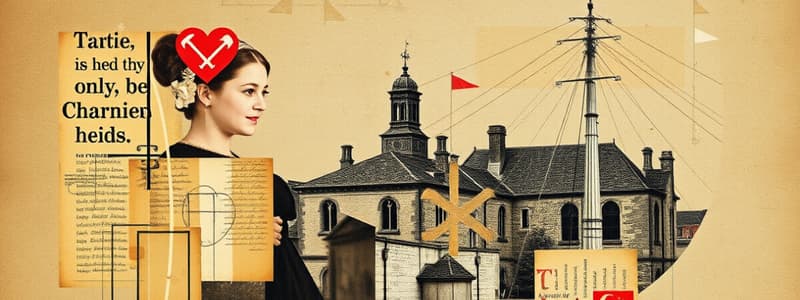Podcast
Questions and Answers
Which king was the first to have English as their mother tongue since the Norman Conquest?
Which king was the first to have English as their mother tongue since the Norman Conquest?
- King Henry IV (correct)
- King John
- King Edward I
- King Richard II
The Great Vowel Shift primarily occurred during the 14th century.
The Great Vowel Shift primarily occurred during the 14th century.
False (B)
What is the name of the famous poet who wrote 'The Canterbury Tales'?
What is the name of the famous poet who wrote 'The Canterbury Tales'?
Chaucer
By the end of the 14th Century, the dialect of ________ emerged as the standard dialect of Middle English.
By the end of the 14th Century, the dialect of ________ emerged as the standard dialect of Middle English.
Match the following features with their descriptions:
Match the following features with their descriptions:
What major event caused the long stressed vowels in English to change their places of articulation?
What major event caused the long stressed vowels in English to change their places of articulation?
Spelling in English changed significantly during the Great Vowel Shift.
Spelling in English changed significantly during the Great Vowel Shift.
What is the time frame during which the Middle English period came to a close?
What is the time frame during which the Middle English period came to a close?
The vowel in 'caas' was simply a longer version of the vowel in ______.
The vowel in 'caas' was simply a longer version of the vowel in ______.
Match the following English terms with their descriptions:
Match the following English terms with their descriptions:
Flashcards are hidden until you start studying
Study Notes
Historical Development of English Language
- Statute of Pleading established English as the official court language and in Parliament.
- King Henry IV (1399) was the first king since the Norman Conquest to have English as his mother tongue.
- By late 14th century, London dialect became the standard for Middle English.
Notable Literature
- Geoffrey Chaucer (1340-1400) wrote "Canterbury Tales" in Middle English.
Old English vs. Middle English Examples
- Old English (c.1000) includes phrases like "Fæder ure" and "urte gedæghwamlican hlaf."
- Middle English (Wyclif, 1384) shows a transformation to "Oure fadir" and "yeue to us today oure eche dayes bred."
- Middle English is more recognizable and readable for modern audiences.
Phonetic Changes
- Middle English underwent significant phonetic shifts with unstressed syllables leading to loss of inflections.
- Greater reliance on rigid word order developed due to inflectional breakdown.
The Great Vowel Shift
- Occurred around the 15th century, dramatically altering vowel pronunciation.
- Long vowels shifted articulation; sounds of long stressed vowels changed, leading to distinctions in pronunciation.
- For example, Middle English "sheep" changed from Latin "e" to Modern English pronunciation.
Transition to Early Modern English
- Modern English period began in the 16th century alongside the advent of printing.
- The East Midlands dialect, especially London’s, became the standard for spelling and grammar.
Dictionaries and Grammar Guides
- Robert Cawdrey published the first English dictionary, “A Table Alphabeticall” in 1604.
- Nathaniel Bailey’s 1721 “An Universall Etymological English Dictionary” contained about 60,000 entries.
- Samuel Johnson’s 1755 dictionary compiled 43,000 words, becoming a significant reference until the Oxford English Dictionary’s publication.
Rise of English as a Scholarly Language
- By the late 16th century, English gained status as a language of academia, rivalling classical languages.
- Vernacular literature began gaining legitimacy, epitomized by Shakespeare's works.
Expansion of Vocabulary in Late Modern English
- The Industrial Revolution and British Empire significantly expanded English vocabulary.
- Introduction of neologisms—new terms created from Latin and Greek roots, e.g., "oxygen" and "vaccine."
- Ongoing influence of technology led to terms like "megabytes" and "microchip" entering common use.
English in Colonial Context
- English was established as an official language in India by the early 20th century, affecting economic and social domains.
- Despite representing only about 3% of India’s population, English speakers influence significant areas of society.
Current Status and Evolution of English
- Today, English is recognized globally as a first, second, or foreign language, evolving continuously due to cultural and technological influences.
- Changes in English reflect ongoing adaptation and response to both internal dynamics and external pressures, comparable to historical developments.
Studying That Suits You
Use AI to generate personalized quizzes and flashcards to suit your learning preferences.




